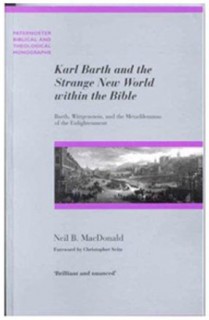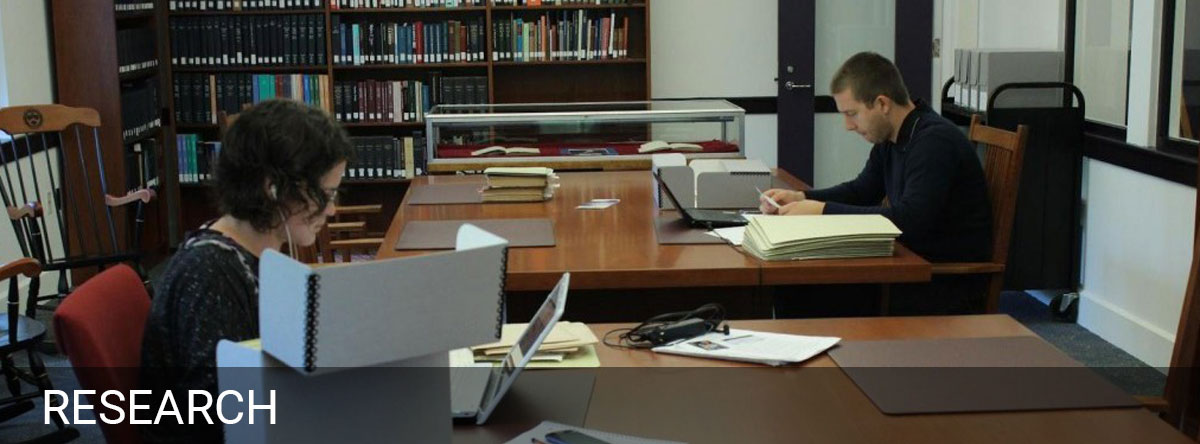 Neil MacDonald, Karl Barth and the Strange New World within the Bible: Barth, Wittgenstein and the Metadilemmas of the Enlightenment (Revised Edition; Paternoster, 2002), xxiv + 403. $39.99 (paperback)
Neil MacDonald, Karl Barth and the Strange New World within the Bible: Barth, Wittgenstein and the Metadilemmas of the Enlightenment (Revised Edition; Paternoster, 2002), xxiv + 403. $39.99 (paperback)
Reviewed by Shane Wilkins (February 27, 2008)
In this volume, Neil MacDonald wants to combat a particular neo-orthodox reading of Barth’s theology as a fideist rejection of the Enlightenment. His provocative thesis is that Barth’s theological epistemology offers “the most cogent” argument in the modern period “on behalf of the rationality of the Christian faith in the face of a loss of belief in the truth of the Bible in the modern age” (xxiv).
MacDonald wants to show that Barth’s theology can accept the Enlightenment challenges to many particular claims of traditional Protestant theology – like historical criticism of the Bible, angelology, the historicity of the resurrection, etc. – without thereby surrendering their theological core. The book’s conceptual core is the theological epistemology upon which Barth’s responses to these challenges depends. While some of this ground has been covered in the literature before, the contribution of MacDonald’s book is to show a startling similarity between Barth’s theological epistemology and Wittgenstein’s private language argument.
The primary point of contact between Barth, Wittgenstein and Kant is their preoccupation with “the metadilemmas of the Enlightenment,” by which MacDonald refers to inquiries about the conditions of the possibility of a subject. Historically, Hume argues that there can be no sensible propositions concerned with things that are neither relations of ideas nor matters of empirical fact. The threat of this disjunction – known in contemporary philosophy as Hume’s Fork – is that it seems to reduce philosophy to either logic and mathematics or the natural sciences. If Hume’s argument is correct, metaphysics and pre-modern theology are both meaningless for they trade in empty concepts that are neither necessary truths, nor matters of empirical fact.
Kant attempted to avoid the prongs of Hume’s Fork in an interesting way. For Kant it is obvious that we do have knowledge of precisely the sort of propositions such as, “Every event has a cause,” which Hume’s Fork disallows. In order to meet Hume’s objection, Kant tries to discover the universal, necessary structures of the human understanding which are the conditions of the possibility of our having legitimate knowledge of such propositions. Kant’s actual account of what those structures are need not concern us here. The important thing is the form of Kant’s argument; arguing from the conditioned thing that we know to the conditions that must be responsible for it. This is the vaunted transcendental turn in Kant’s philosophy, which seems to ‘save’ philosophy from Hume’s Fork by legitimating this sui generis class of synthetic a priori propositions.
On MacDonald’s interpretation, Barth, like Kant, is concerned with a metadilemma. Just as Hume seemed to announce the death of philosophy by reducing its subject matter to non-philosophical disciplines, so Overbeck proclaims the end of Christianity and attempts to decompose theology into non-theological disciplines such as church history and anthropology of religion. The interesting thing is that Barth’s response to Overbeck appears analogous to Kant’s response to Hume: just as Kant tries to save philosophy by appealing to the existence of a class of propositions that escape Hume’s reduction of philosophy, so Barth tries to save theology by appealing to the existence of a class of propositions that escape Overbeck’s reduction of theology. The class of propositions Barth is concerned with here are what MacDonald calls ‘sui generishistorical truth claims’.
The distinction between straightforwardly ‘historical’ and ‘sui generically historical’ claims is that the former are ‘measurable’ and the second have their ‘measure’ only in themselves. MacDonald presumably means that ordinary historical claims can be investigated rationally by the academic discipline of history, but sui generis claims cannot. Why not? MacDonald repeatedly links claims about the epistemological status of sui generis historical events with Barth’s insistence in the Romanscommentary that ‘God is God’, where the italics indicate that God’s transcendence implies that one can properly speak of God only in the paradoxical language of dialectic (cf. 59ff). It is not entirely clear what exactly the relation should be between the claim about the ‘measurability’ of the sui generis and the claim that God can only be spoken of dialectically. Sometimes MacDonald seems to ground the former in the latter, and sometimes the two claims seem to be logically independent of one another.
What is clear, however, is that the mature Barth employs both claims in his understanding of revelation. For Barth, “God’s self-revelation itself . . . creates the very possibility of the means of measuring it” (241). MacDonald notes that here Barth is offering something like a transcendental argument about the condition of the possibility of revelation. This transcendental turn towards sui generis historical truth-claiming is presumably what makes Barth’s theology “the most cogent” argument for the rationality of the Christian faith in MacDonald’s estimation because it allows Barth to hold on to the core affirmations of Christian orthodoxy while simultaneously affirming what is valuable in the Enlightenment critiques of orthodoxy. Thus, for instance, the orthodox theological tradition had asserted the reality of angels, as straightforward historical items within the world. The Enlightenment has shown this belief to be false. Barth’s transcendental turn allows him to accept the Enlightenment’s verdict against the orthodox view of angels while nevertheless asserting their existence in a sui generis sense. Barth thus inherits both traditions, but is not reducible to either – contrary to the neo-orthodox picture of Barth.
Thus, just as Kant attempts to save philosophy from Hume’s Fork with the synthetic a priori, Barth attempts to save theology from Overbeck’s dilemma with sui generis historical theological claims. But it is also clear that Barth’s ‘transcendental argument’ here is not exactly Kantian. Barth’s position actually bears more of a ‘family resemblance’ to Wittgenstein than Kant, MacDonald provocatively suggests.
The central point of confluence MacDonald explores is Wittgenstein’s private language argument. In thePhilosophical Investigations, Wittgenstein argues that the traditional picture of language is desperately confused. On the traditional picture, concepts and sensations are private to the individual. People communicate to one another by translating the sentences of public language back into their own idiosyncratic private concepts. The specter of Cartesian skepticism depends on this picture of language, for the skeptic is asking how private experience can have some objective (i.e., public) validity. If Wittgenstein is right that the concept of a private language is incoherent, then the skeptical problem dissolves because the skeptic must rely upon the very concepts he intends to put into question in order to pose the question itself.
According to MacDonald, the thrust of Wittgenstein’s private language argument is that (Cartesian) skepticism is impossible because the skeptic “attempts to ‘measure’ – criticise – a very distinctive object of measurement, namely: the object of measurement that constitutes the means of measurement itself” (306), which is impossible. This, MacDonald points out, “is precisely the position Barth reached in the Church Dogmatics as regards epistemology” (ibid). In other words, both Barth and Wittgenstein are objecting to the idea that there is a criterion outside the phenomenon of revelation or language by which they could be judged. ‘Language’ for Wittgenstein and ‘revelation’ for Barth both have a sui generis identity that is supported by a sort of non-Kantian transcendental argument.
If MacDonald’s interpretation of Barth and Wittgenstein is correct, the confluence of these two figures is startling. Whether Barth’s theological epistemology is really the ‘most cogent’ way of arguing for the rationality of the Christian faith or not, MacDonald has shown something interesting indeed about the relationship of Barth and Wittgenstein that will hopefully spur further scholarly interest in relating Barth to broader trends in the contemporary intellectual climate. Nevertheless, I must register a few reservations.
First, Wittgenstein’s private language argument is notorious for receiving contentious and conflicting interpretations, to say nothing of whether the argument actually succeeds. So, MacDonald might be opening Barth’s epistemology up to new philosophical criticisms if arguments against Wittgenstein can be appliedmutatis mutandis to Barth as well.
Second, it would seem appropriate to inquire more deeply into the thesis that sui generis events are not capable of historical investigation. This principle is obviously central to Barth’s claims, but it is not immediately clear why an event’s being unique makes it inaccessible to historical investigation. After all, Caesar’s crossing the Rubicon was unique in the sense that it was unrepeatable. The epistemological ‘uniqueness’ of the sui generis historical truth claims Barth is concerned with must derive in some way from their being acts of God. But then the question returns: Why should God’s acting in history make that act inaccessible to historical investigation? In response, MacDonald would probably appeal to ‘God is God’ to ground the claim that God’s acts are inscrutable to historians, but on what would that claim rest? Ultimately it must rest upon the adequacy of Barth’s exegesis, which brings me to my third reservation.
For the Christian theologian, the success of Barth’s theological epistemology must be based in its success as an interpretation of the Bible. On that score, I remain unconvinced on exegetical grounds that the Bible teaches that ‘God is God’ in the epistemological sense Barth and MacDonald want.
But one could have exegetical reservations on more than just this fundamental principle . On each of the separate challenges the Enlightenment poses to traditional theology (angelology, the historicity of the resurrection, etc.), one ought to examine whether Barth’s exegesis of the text really supports the claim that these events are sui generically historical rather than straightforwardly historical in the way the tradition assumed.
Despite these reservations, MacDonald’s book represents an important contribution and should be required reading for anyone interested in seriously engaging Barth and contemporary philosophy.
The views expressed here are strictly those of the author; they do not necessarily represent the views of the Center for Barth Studies or Princeton Theological Seminary.

